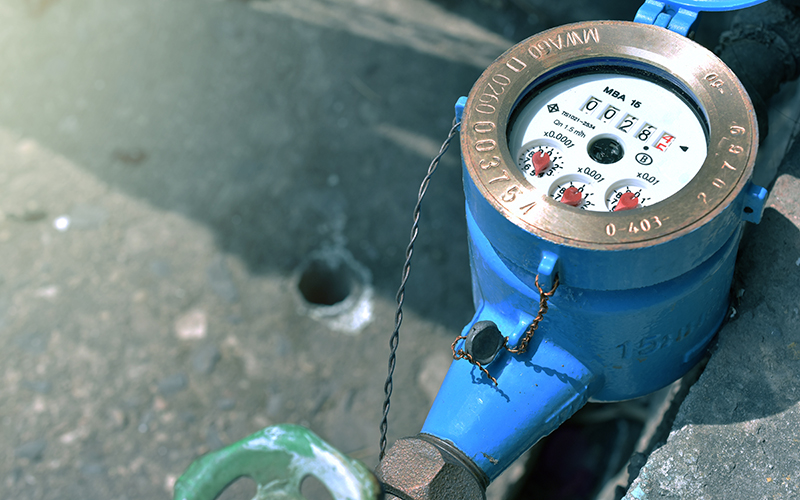News
Water Metering Poised To Become Compulsory In England
The National Infrastructure Commission (NIC) has just published the results of its Second National Infrastructure Assessment, a five-yearly review detailing a programme of transformation for England’s energy, transport and other key networks over the coming 30 years, finding that making infrastructure improvements is achievable and affordable if the appropriate policies are implemented now.
Where the water sector is concerned, the plans include constructing additional water supply infrastructure and targeting water leak detection and repair, as well as bringing in compulsory water metering for domestic properties to help reduce water demand.
As the Commission explains, the government will need to sustain its commitment of an annual pledge of around £30 billion in public sector infrastructure investment until 2040. Furthermore, private sector investment will need to increase from the £30-£40 billion seen over the last ten years to £40-50 billion in the 2030s and 2040s.
This significant investment will be absolutely vital if the UK is to restore balance to its economic geography while meeting its climate obligations and protecting and enhancing the natural environment.
In order to attract this level of investment, the Commission suggests that a new approach will be necessary. Firstly, ensuring political stability will make investors feel more certain and help to shore up supply chains, while providing clear guidance on priorities, delivering business models that support emerging technology will help drive investment.
The organisation also recommended that the planning system for major projects be sped up, particularly for energy transmission schemes, with other suggestions including regularly updated government national policy statements, more effective sharing of environmental data, strategic spatial planning and clearer community benefits for regions that host key infrastructure.
What is water metering?
Water metering is simply a way in which water usage can be monitored, with a device installed somewhere in a residential or commercial building to measure the volume of water consumption.
From a business perspective, there are clear benefits associated with logging water flow data, allowing companies to achieve maximum savings and reduce water wastage. The process itself is fully automated so you can let technology do all the hard work for you, with water flow tracked at hourly intervals.
This means that sudden spikes in usage are identified in real time, allowing you to call out engineers immediately to check for issues, such as water leaks.
If trends in the data change over time, it’s also an indication that the demands of your business have changed, so you’re able to react accordingly and make changes to your efficiency strategies to continue enjoying optimum savings no matter what.
You can break down your water usage by building, department, tenant, equipment and even shift, comparing sites, identifying peak times and correlating use with equipment and personnel. This means you enjoy total visibility over who is using water, how much they’re using and where they’re using it.
Water leaks are also hugely problematic across the network, with up to three billion litres of water lost to leakage in England each and every day, but with automated meter reading, you can enjoy ongoing leak monitoring as well, boosting the resilience of your business to future crises.
How does automated meter reading work?
It couldn’t be easier to get going with your smart meter. All you need to do is have one installed onsite (which costs around £700), with the device measuring the same data that your main billing meter will.
However, a smart meter will feed the data back into a digital reporting platform so you can gain greater levels of insight into the water use of your business. You can then use this information to see how effective your environmental projects and sustainability campaigns are, as well as taking advantage of accurate information for water bill validation.
What else does the Commission recommend?
Water meters aside, this latest review calls on the government to set outcome-based service standards for infrastructure investments. For example, operators should have to provide details of the costs of meeting these standards while making climate adaptations to their networks, which will help inform regulatory and funding settlements in the future.
It also wants to see further investment in infrastructure to reduce the risks of surface water, river and coastal flooding, as well as working to reduce the water supply gap (which is at least 4,000 megalitres per day) by tackling leaks and reducing water demand, as well as constructing new storage and transfer networks.
By taking steps such as these, water quality will be supported – one of the biggest concerns facing the general public right now.
Bringing in nature-based solutions will also help to deal with the issue of sewer overflows (another hot topic of the moment), as well as being more proactive about managing underground networks to improve the regulation of water flow into treatment plants.
Sir John Armitt, chair of the NIC, said: “ The good news is that modern, reliable infrastructure can support economic growth, help tackle climate change and enhance the natural environment. We stand at a pivotal moment in time, with the opportunity to make a major difference to this country’s future. But we need to get on with it.
“People often talk about infrastructure as the backbone of our economy: what our infrastructure needs now is the collective mettle to turn commitments into action that will reap rewards for decades to come.”
Want to find out more?
If your interest has been piqued by all this talk of water meters, get in touch with the team here at H2o Building Services to see how we can help.
We have a team of experienced water consultants on hand to come out to your site and get you up and running with these devices so that you can start benefiting immediately, saving yourself money and boosting your green credentials at the same time. Give us a call today to see how we can help you start operating more sustainably now and well into the future.
